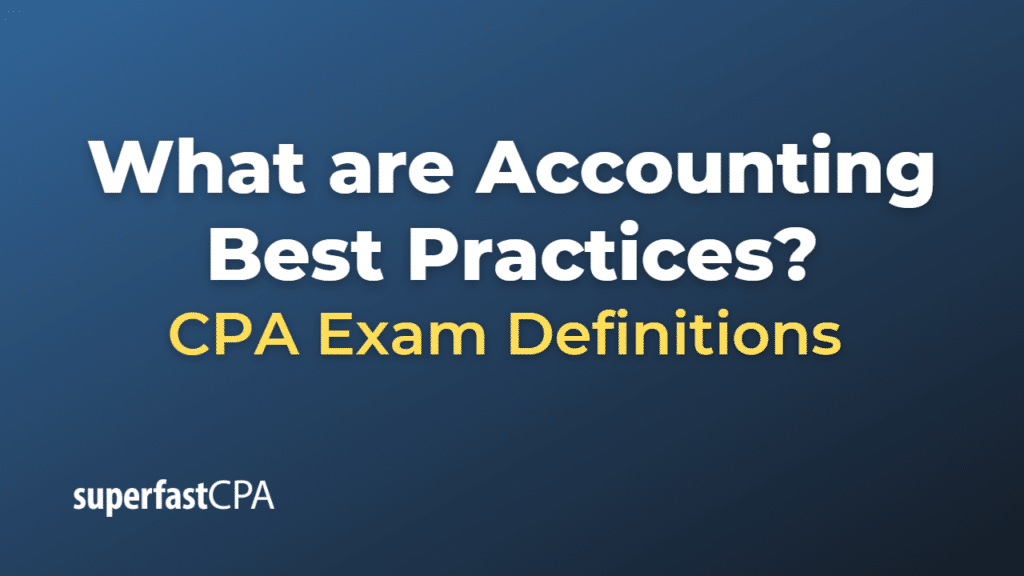Accounting Best Practices
Accounting best practices are guidelines and recommendations that help businesses maintain accurate, efficient, and transparent financial record-keeping and reporting. These practices help organizations ensure their financial statements are reliable, consistent, and compliant with applicable laws and regulations. Some common accounting best practices include:
- Implement a strong internal control system: Establishing and maintaining a robust internal control system helps prevent errors, fraud, and mismanagement. This includes segregating duties, implementing authorization and approval processes, and regularly reviewing and monitoring financial transactions.
- Follow Generally Accepted Accounting Principles (GAAP) or International Financial Reporting Standards (IFRS): Adhering to GAAP or IFRS ensures that financial statements are prepared consistently and transparently, making it easier for stakeholders to understand and compare financial information across different organizations.
- Use double-entry bookkeeping: Double-entry bookkeeping is a method of recording financial transactions that involves debiting one account and crediting another. This system helps maintain accurate financial records and provides a built-in check for errors, as the total debits should always equal the total credits.
- Maintain accurate and timely records: Regularly recording financial transactions helps ensure that financial statements are up-to-date and accurate. This practice also makes it easier to identify and correct errors, monitor performance, and make informed financial decisions.
- Conduct regular reconciliations: Regularly reconciling accounts, such as bank accounts, accounts receivable, and accounts payable, helps identify discrepancies and errors in a timely manner. This practice also helps ensure that financial records are accurate and complete.
- Implement a budgeting and forecasting process: Developing budgets and financial forecasts helps businesses plan for the future, allocate resources effectively, and monitor financial performance. Regularly comparing actual results to budgeted amounts can help identify areas for improvement and inform decision-making.
- Regularly review financial statements: Regularly reviewing financial statements, such as the income statement, balance sheet, and cash flow statement, helps businesses monitor their financial health, identify trends and anomalies, and make informed decisions.
- Maintain clear and organized documentation: Keeping clear and organized records of financial transactions, supporting documents, and accounting policies helps ensure that financial information can be easily accessed, understood, and audited.
- Continuously improve accounting processes: Periodically reviewing and updating accounting processes helps identify inefficiencies and opportunities for improvement. This practice can help businesses streamline their accounting operations and adapt to changes in the regulatory environment.
- Engage professional help when needed: Working with professional accountants, auditors, or consultants can help businesses navigate complex accounting issues, ensure compliance with laws and regulations, and obtain expert advice on financial management.
By following these accounting best practices, businesses can maintain accurate, efficient, and transparent financial record-keeping and reporting, which is essential for making informed decisions, attracting investment, and ensuring long-term success.
Example of Accounting Best Practices
Let’s consider a fictional example of a small software development company called “Innovative Solutions” to illustrate how accounting best practices can be implemented in a real-life business scenario.
- Implement a strong internal control system: Innovative Solutions establishes clear policies and procedures for handling financial transactions. They segregate duties by assigning different employees to handle tasks such as invoicing, payment processing, and bank reconciliations, reducing the risk of errors and fraud.
- Follow GAAP: The company adheres to Generally Accepted Accounting Principles (GAAP) when preparing its financial statements to ensure consistency and transparency, making it easier for stakeholders to understand and compare their financial performance with other businesses.
- Use double-entry bookkeeping: Innovative Solutions uses double-entry bookkeeping to maintain accurate financial records, ensuring that every financial transaction has a corresponding debit and credit entry in the general ledger.
- Maintain accurate and timely records: The company records financial transactions promptly and accurately, ensuring that its financial statements are up-to-date and providing a reliable basis for decision-making.
- Conduct regular reconciliations: Innovative Solutions performs monthly bank reconciliations to compare its cash balance in the general ledger with its bank statement, identifying and resolving any discrepancies in a timely manner.
- Implement a budgeting and forecasting process: The company develops an annual budget and financial forecast, setting targets for revenue, expenses, and net income. Management regularly compares actual results with budgeted amounts, adjusting their strategies and resource allocation as needed to achieve their financial goals.
- Regularly review financial statements: Management reviews financial statements monthly to monitor the company’s financial health, identify trends, and make informed decisions about investments, staffing, and other operational matters.
- Maintain clear and organized documentation: Innovative Solutions keeps well-organized records of financial transactions, supporting documents, and accounting policies, ensuring that financial information can be easily accessed, understood, and audited.
- Continuously improve accounting processes: The company periodically reviews and updates its accounting processes, identifying opportunities for improvement and streamlining operations. They invest in accounting software to automate routine tasks and improve the accuracy and efficiency of their financial record-keeping.
- Engage professional help when needed: Innovative Solutions works with a professional accountant to ensure compliance with tax laws and regulations, obtain expert advice on financial management, and conduct an annual audit to verify the accuracy and reliability of their financial statements.
By implementing these accounting best practices, Innovative Solutions maintains accurate, efficient, and transparent financial record-keeping and reporting. This helps the company make informed decisions, attract investment, and ensure long-term success.













